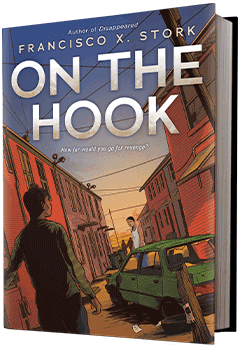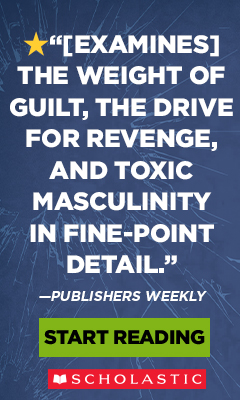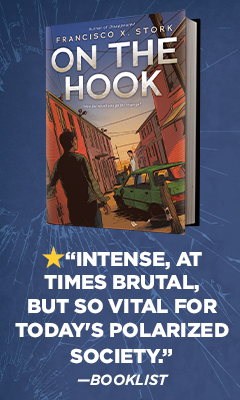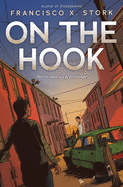On the Hook
by Francisco X. Stork
In On the Hook, Francisco X. Stork (Marcelo in the Real World) details the surprising and thoroughly engrossing transformation of Hector Robles, a quiet, chess-loving high school student who becomes a reform school inmate pursuing justice on his own terms. This novel is an adaptation of Behind the Eyes, the author's first book, and a deeper dive into the experiences of one particular character: Hector. The teen's travails offer much to think about regarding empathy, revenge and cowardice. It is a story that is sometimes amusing, sometimes difficult, but always heartfelt and riveting.
Ever since his father died, 16-year-old Hector has lived in the "stupid, miserable housing projects" of El Paso, Tex., with his mom and older brother, Fili. His best friend and chess club teammate, Azarakhsh Pourmohammadi (Azi), lives there too. Hector and Azi have big plans for the future that begin with getting scholarships so they can go to college, Azi to become a doctor and Hector an engineer. Chess team captain tryouts are coming up and Azi insists Hector would make a better captain for next year's team than she would, encouraging him to try out even though she teases him that she is "smarter than [him] in most ways."
But Hector is shy and thinks he's no leader. When classmate Joey and Joey's older brother, Chavo ("their local drug dealer"), begin singling out Hector with "hostile stares and belligerent gestures," Azi isn't fazed. Hector, on the other hand, tries desperately to avoid the dangerous pair, believing his actions to be those of "a scared rabbit." Joey corners him at work and Hector, frozen in fear, fails to stop him as Joey uses Hector's own boxcutter to carve a "C"--for "cobarde"--into Hector's chest. What hurts the most is that Hector, terrified and humiliated, is sure he truly is a coward and the proof of it is now branded on his chest. Compounding the shame is Hector's memory of his own father facing imminent death with courage; Hector believes that when he was confronted, he acted like a "gusano"--a worm.
Then Fili tells Hector he's dating Chavo's ex-girlfriend, Gloria. Hector's sense of imminent danger overshadows any happiness he feels for his "clueless" brother. Hector's terror increases until the day he's scheduled to read a deeply personal essay about his father to the Lion's Club. He breaks down in tears before finishing, overcome with shame; Fili and Gloria offer to drive him home. When Fili stops the truck in a church parking lot so the couple can tell Hector that they are engaged, Chavo and Joey suddenly appear. Fili gets out to talk with Chavo "man to man," but during the ensuing fight, Joey grabs a baseball bat and bashes in Fili's head. Hector, galvanized by love for Fili, "is finally able to move": he puts the truck in gear and runs Chavo down.
In this moment, everything changes for Hector. All his previous problems are irrelevant. This "new" Hector is consumed with rage and single-minded in his determination to avenge his brother's death. Hector, who has good grades and recommendations from teachers, friends and family, is given the opportunity to stay out of reform school if he tells the judge he didn't mean to step on the gas--that it was all an unfortunate accident. But now that he's taken action, Hector refuses to go back to "his old coward self"--the new Hector is "hard and sharp like an ax," and he will make Joey pay, even if that means following his brother's murderer to reform school.
When Joey swings his bat and Fili topples, Hector's choices seem to move him farther from the person Azi, his family and he himself have always expected him to be and all his decisions seem to run counter to his own best interests. However, Hector feels he needs to do something about the disgust he feels for himself before he can leave the reform school and go home. To his credit, Hector never stops thinking, never stops learning and always tries to figure out what it means to act with courage. He takes his cues from his own deep understanding of chess, deciding that "courage [is] doing what need[s] to be done, even when you [are] afraid."
A note from the author explains that this book is "a new novel, but it contains some bones from an earlier novel," Behind the Eyes. About a year after that first YA novel of Stork's came out, he "visited a reformatory school... where the students were reading the book." On his way home, Stork writes, "I was filled with the sense that the book had not given the students all that it could have given them. The young men in the school had not fully seen themselves in Hector's fears and hopes and moral decisions." And so, Stork returned to Hector. On the Hook is not always an emotionally easy read but it is a captivating and significant work of literature. Stork masterfully balances the constructive aspects of Hector's struggle to find his own truth with the former good kid's caustic need for revenge, and contrasts them both with Joey's positive growth at the reform school. Tension mounts palpably through Stork's third-person narration, culminating in the story's powerful conclusion. This return to an earlier work is a glimpse into a tough, sometimes violent world that ultimately serves plenty of hope; in showing this, Stork has created a thought-provoking, thoroughly essential novel. --Lynn Becker








